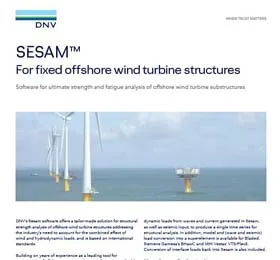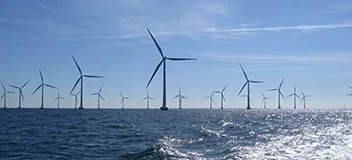DNV GL launched new design software for ultimate strength and fatigue analysis of offshore wind turbine structures - Sesam Wind
Sesam Wind for the wind industry
Building on 40 years as a leading design tool for engineering floating and fixed offshore structures, the new Sesam module uniquely addresses the wind industry need to model the combined effect of wind and wave loads.
Since its launch in 1969, Sesam software has been a leading tool for engineering offshore structures. The new tailor-made module, Sesam Wind, can be used for design and fatigue analyses of wind turbine substructures. Its analysis functionality complies with the DNV GL offshore standard DNV-OS-J101 Design of Offshore Wind Turbines. Fatigue and ultimate strength wind load calculations can be performed based on direct time-series simulations of combined wave and wind loads.
“This new design module for the wind energy industry means that DNV GL can offer a complete software solution for the entire value chain, from construction through installation, in-place, modification and removal conditions,” explains Torbjørn Lindemark, DNV GL.
3D modelling functionality
The 3D modelling functionality in Sesam GeniE fem software allows traditional beam modelling of the slender parts while the complex transition between the wind tower and supporting structure can be accurately modelled using shell elements. “This gives a precise determination of the strength in this part as compared to pure beam modelling. Wave loads are generated by the program and combined with imported wind load time series to determine the combined response for the fatigue and strength analysis. S-N curves and stress concentration factors for tubular joints are automatically assigned to the fatigue hot spots to speed up the analysis process,” says Mr Lindemark.
“DNV GL is a global leader in the wind energy industry, and the complementary in-house combination of advisory services, certification and software is unique. There is a great market potential for innovative wind software like Sesam Wind, and we are well positioned to achieve further growth,” says Are Føllesdal Tjønn, DNV GL.
About Sesam software
Sesam was first made in 1969 with the purpose to perform strength analysis of large ship structures. Since then it has evolved both in capabilities and technology. It started as a mere finite element system – today it is based on modern concept modeling techniques integrated with advanced hydrodynamics to do strength assessment. It has become a leading world-wide tool for strength assessment and sea-keeping of ship and offshore structure in the range from shallow to ultra-deep waters in harsh environment.
About DNV GL in the wind industry
DNV GL has been a global leader in the wind industry for over 25 years and is the largest wind energy consultancy in the U.S. as well as one of the world’s largest combined consultancies and certification bodies. More than 250 DNV GL colleagues are employed directly in delivering wind energy expertise while many more contribute from our other business areas such as maritime and energy. Our wind energy offices are located in Denmark, UK, Germany, Norway, U.S., China, South Korea, Singapore, Brazil, and India.
DNV GL offers a broad range of advisory services that support the wind industry in its critical technical and financial decision making. These include initial site selection, wind resource assessment and energy analysis to power performance testing, technical due diligence for investors and operational risk management.
DNV GL also provides third party type certification of onshore and offshore turbines, as well as certification of offshore wind farms. This helps to minimize late design changes and secures the confidence of manufacturers, developers, owners, financiers, insurers and the relevant authorities.
Since 2001, DNV GL has worked in close cooperation with the wind industry to develop the state of the art knowledge that ensures transparent, cost efficient and unified approaches to building wind energy technology. This knowledge is published in our standards, rules, guidelines and recommended practices. We are also leading international efforts to standardize design practices through active participation in the IEC and other standards bodies.
Building on our role as the world’s leading classification society, DNV GL has supported the development of all types of installation and service vessels. This included the development of the world’s first class notations for these vessels to improve safety and promote uniform standards.


